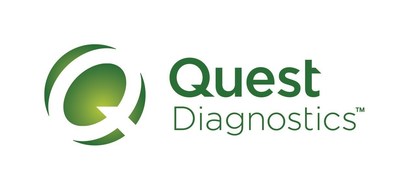Company's AD-Detect™ Portfolio Offers AB 42/40 and Other Plasma Biomarker Testing, Alongside Traditional Cerebrospinal Fluid and Genetic Tests, to Provide Robust Offering in Brain Health
SECAUCUS, N.J., April 22, 2024 /PRNewswire/ -- Quest Diagnostics (NYSE: DGX), a leader in diagnostic information services, today announced the launch of a new blood biomarker test for phosphorylated tau 217, or p-tau217. P-tau217 is a biomarker associated with Alzheimer's Disease (AD), supported by research as useful for an early diagnosis of AD.
The test is the latest addition to the AD-Detect™ portfolio of blood tests for assessing the risk of Alzheimer's Disease, which also includes testing for an array of AD biomarkers, including p-tau181 and amyloid beta (AB) proteins, as well as Apolipoprotein E (ApoE) isoform and plasma testing, for patients with cognitive impairment. With a physician's test order, patients may provide a blood draw for testing from any of Quest's 2,000 patient service centers in the United States. The test is expected to be available for ordering on April 26, 2024.
Quest Diagnostics continually seeks to expand access for patients and providers to innovations in the field of dementia, including AD, through advanced diagnostic solutions. The addition of p-tau217 to Quest's existing portfolio of neurology testing supports a comprehensive offering, including not only the groundbreaking use of blood tests to evaluate risk of AD, but also cerebrospinal fluid (CSF) tests to help providers assess amyloid beta 42, tau and ApoE genetic risk status.
"By expanding our test availability to include p-tau217 and other blood-based biomarkers, Quest has invested significantly in providing insights to aid risk assessment and early diagnosis of Alzheimer's Disease," said Kathleen Valentine, Vice President and General Manager, Neurology, Quest Diagnostics. "We know diagnosing AD is challenging, and believe our AD Detect™ services can help individuals better understand their possible risk."
While amyloid PET imaging is an established method for aiding the diagnosis of AD, it is significantly more expensive, invasive and specialist-dependent than blood tests. Through its proprietary AD-Detect™ line of blood tests, Quest enables access for patients and providers to quality laboratory innovations for Alzheimer's Disease on a broad national scale.
"Testing to assess Alzheimer's disease has changed rapidly in the last few years, and we expect this area to continue evolving," said Michael Racke, MD, Medical Director of Neurology at Quest Diagnostics. "The future of assessing risk or diagnosing AD will likely include a variety of testing modalities and biomarkers, including blood, to help clinicians identify patients in the early stages of disease progression. When examined with cognitive test results, p-tau217 has the potential to aid diagnosis, and will play a valuable role in assessing patients with cognitive impairment, especially when combined with other tests."
Nearly 7 million Americans have Alzheimer's, the most prevalent dementia, a number projected to reach 14 million by 2060. New blood tests offer the potential for primary care physicians as well as specialists to identify people at risk for Alzheimer's Disease even before symptoms manifest. Seventy-seven percent of physicians say new therapies will transform Alzheimer's into a chronic, manageable disease, according to a special report from Quest based on a survey by Harris Poll.
A leader in neurology, Quest Diagnostics is committed to developing innovative laboratory services to aid in evaluating patient risk of Alzheimer's Disease and other dementias. Through its courier network and 2,000 patient service centers in the U.S, Quest is uniquely positioned to collect blood specimens, with a physician's order, and provide advanced laboratory testing on a national scale.
Recently published research in the Journal of Investigative Medicine, Frontiers in Neurology and Alzheimer's & Dementia demonstrates the value of the company's AD-Detect™ amyloid beta test in aiding risk assessment of AD. The company also continues to explore the potential of other biomarkers for assessing AD risk that may complement its existing portfolio. For more information, visit www.QuestForTheCure.com.
About Quest Diagnostics
Quest Diagnostics works across the healthcare ecosystem to create a healthier world, one life at a time. We provide diagnostic insights from the results of our laboratory testing to empower people, physicians and organizations to take action to improve health outcomes. Derived from one of the world's largest databases of de-identifiable clinical lab results, Quest's diagnostic insights reveal new avenues to identify and treat disease, inspire healthy behaviors and improve healthcare management. Quest Diagnostics annually serves one in three adult Americans and half the physicians and hospitals in the United States, and our nearly 50,000 employees understand that, in the right hands and with the right context, our diagnostic insights can inspire actions that transform lives and create a healthier world. www.QuestDiagnostics.com.
SOURCE Quest Diagnostics
